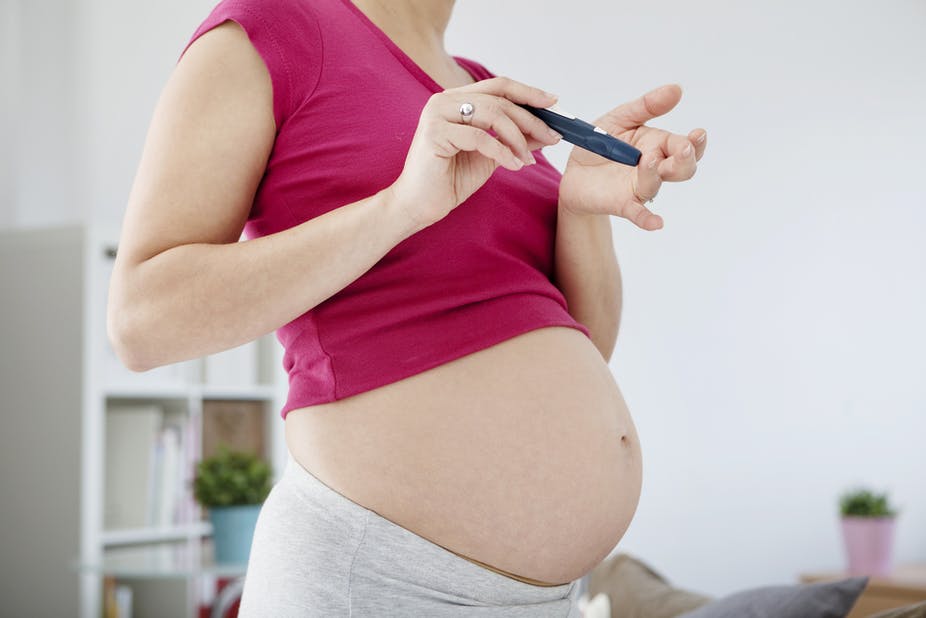During pregnancy, you can help control gestational diabetes by taking healthy diets, exercising and taking medication (if necessary). In addition, controlling blood sugar can keep you and your baby healthy and prevent a difficult childbirth experience. If you have gestational diabetes during pregnancy, your blood sugar will likely return to its usual level soon after delivery. But if it is not your first pregnancy and you've had gestational diabetes prior, there is a higher probability of getting type 2 diabetes. Therefore, if this happens, you'll need to be tested for changes in your blood sugar level more often.
What Causes Gestational Diabetes?

However, during pregnancy, your body makes more hormones and goes through other changes, such as weight gain. These changes cause your body's cells to use insulin less effectively, a condition also known as insulin resistance that increases your body's need for insulin.
All pregnant women have some insulin resistance when they enter late pregnancy, but some women have it even before they get pregnant. When these women start pregnancy with an increased need for insulin, they are more likely to have gestational diabetes.
Who's At Risk Of Getting Gestational Diabetes
Any woman can develop gestational diabetes during pregnancy, but you're at an increased risk if:- you are over 40
- your body mass index (BMI) is above 30
- you previously had a baby who weighed 4.5kg (10lb) or more at birth
- you had gestational diabetes in a previous pregnancy
- 1 of your parents or siblings has diabetes
- you are of south Asian, Black, African-Caribbean or Middle Eastern origin
- you have had a gastric bypass or other weight-loss surgery
Symptoms Of Gestational Diabetes

- increased thirst
- needing to pee more often than usual
- a dry mouth
- tiredness
- blurred eyesight
- genital itching or thrush
How Gestational Diabetes Affect Your Pregnancy
 (Image credits to Parents)
(Image credits to Parents)
Most women diagnosed with gestational diabetes go on to have normal pregnancies with healthy babies. However, in some cases, gestational diabetes can cause issues such as:
- Your baby growing larger than usual, leading to difficulties during the delivery and increasing your likelihood of needing induced labour or a C-section.
- A condition called polyhydramnios, when there's too much amniotic fluid (the fluid that surrounds the baby) in the womb, which can cause premature labour or problems at delivery
- Premature birth, which is giving birth before the 37th week of pregnancy
- Preeclampsia, a condition that causes high blood pressure during pregnancy and can lead to complications if not treated
- Your baby developing low blood sugar or jaundice (yellowing of the skin and eyes) after they're born, which may require treatment in the hospital
- Stillbirth, but this is rare.
Gestational Diabetes Prevention
Before getting pregnant, you may be able to prevent gestational diabetes by losing weight if you're overweight, and getting regular physical activity.
However, don't try to lose weight if you're already pregnant. This is because you'll need to gain some weight during pregnancy for your baby to be healthy. Instead, discuss with your doctor how much weight you should gain to have a healthy pregnancy.
Treatment for Gestational Diabetes
 (Image credits to San Antonio Current)
(Image credits to San Antonio Current)
Fortunately, there’s a lot you can do to manage gestational diabetes. One of it being going to all your prenatal appointments and following your treatment plan thoroughly, including:
- Checking your blood sugar regularly to ensure your levels stay in the healthy range
- Eating healthy food in the right amounts at the right times. You can also follow a healthy eating plan that is created by your doctor or a dietitian.
- Being active by doing regular physical activities that are moderately intense, such as brisk walking. This can lower your blood sugar and make you more insulin sensitive, so your body won't need as much. Be sure to check with your doctor about what physical activities you can do during pregnancy and what you should avoid to prevent harming you and your baby.
- Monitoring your baby. Your doctor will check your baby's growth and development at every appointment.
However, if healthy eating and staying active aren’t enough to manage your blood sugar levels, your doctor may prescribe other medications like insulin or metformin.
Long-Term Effects Of Gestational Diabetes
Gestational diabetes generally will go away after birth. But women who’ve had it may likely develop:
- Gestational diabetes again in the future pregnancies
- Type 2 diabetes - a lifelong type of diabetes
This is why you should be checked for diabetes through a blood test 6 to 13 weeks after giving birth and once every year after that if your prior result is normal. If you develop symptoms of high blood sugar, such as increased thirst and needing to pee more often than usual, immediately see your doctor. Do not wait until your next test.
You’ll also be advised about things you can do to reduce your risk of getting diabetes, such as maintaining a healthy weight, eating a balanced diet and exercising regularly.
Source- This article was written by HappyPreggie, published on May, 2023. Read the original article.

